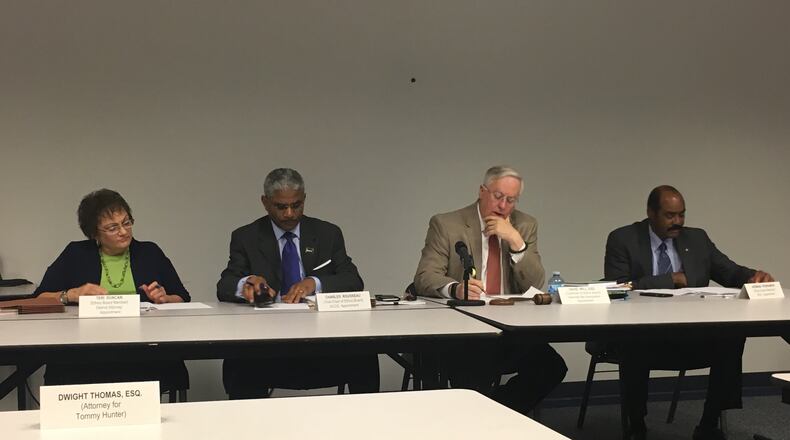After two county commissioners were subject to hearings following complaints about their speech, Gwinnett County is proposing changes to its ethics ordinance.
Broadly, the changes would limit who can make an ethics complaint and narrow the issues subject to a complaint. The revised ordinance also ends the ability to file a complaint against someone who has left county employment.
The changes are being considered after two instances in which people who lived outside Gwinnett County pursued ethics complaints against county commissioners for their speech — Tommy Hunter’s derogatory Facebook posts about Democrats and then-Rep. John Lewis; and Marlene Fosque’s comments about an anti-illegal immigration activist in a public meeting.
Hunter was reprimanded in 2017, while county commissioners in 2020 dropped the complaint against Fosque after the ethics board recommended she receive a written warning.
David Will, an attorney who chaired the ethics board for both those cases, said he is glad to see the county proposing changes. He had suggested limits on who can file a complaint, he said.
Will said he thought Gwinnett officials had seen the effects of having a broad ordinance, and it made sense to ensure it was enforceable.
“You want whatever ordinance is there to work and work well,” he said. “If it’s not working to accommodate what you hope to do, then tweak it.”
The new ordinance, which county commissioners are scheduled to consider Tuesday, limits those who can make a complaint to any county resident, county employee or business with a presence in the county or that transacts business with the county. It also separates aspirational language about how county officials comport themselves from actionable areas, labeling the latter as Standards Enforceable by Complaint.
And it says complaints can’t be processed or filed once someone is out of office or no longer employed by the county.
That change was concerning to Will, who said complaints should still be able to be made so issues come to light.
Dwight Thomas, an attorney who is representing Hunter in a federal lawsuit against the county, said he thought the changes were “a reasonable thing to do to avoid further litigation.”
An ordinance that allows people to police political speech is not sustainable, Thomas said.
Other experts said the changes Gwinnett was proposing were beneficial, but said the ordinance was in some ways still problematic.
Carla Miller, the president of CityEthics, said she supported the separation of enforceable ethics provisions — like not using confidential information obtained from the county to benefit oneself — from aspirational behavior.
The previous ordinance mixed the two, she said, which led to complaints about elected officials’ speech.
But she said she worries that no one from outside the county can file a complaint, even if they have knowledge of an ethical lapse, and there’s no way to make a complaint anonymously.
“It’s an overreaction to having a poorly drafted ethics code to begin with,” she said. “It’s an overreaction to a painful time period.”
Miller also expressed concerns about existing parts of the ordinance, like the county attorney’s role in disseminating the complaint and the fact that the ethics board is newly created for each complaint instead of being a standing body. She also said there weren’t adequate whistleblower protections.
“There’s many areas here where the process can be manipulated and favoritism can enter into it,” Miller said. “I think more work needs to be done.”
Edward Queen, a faculty member at the Emory University Center for Ethics, also expressed concern about the fact that the ethics board is not permanent. He said while that was “disturbing,” the proposed changes help make a murky ordinance clearer by focusing on compliance.
“It’s as good a rewrite as I think they can make,” he said. “They’re going to learn as they do.”
About the Author
The Latest
Featured



